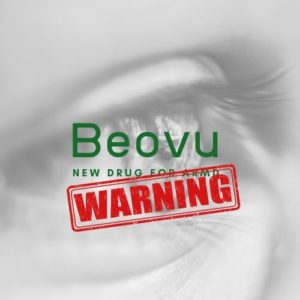Retina Specialists Warned About Beovu


The ASRS reported 14 cases of retinal vasculitis (inflammation) developing in patients receiving Beovu. 11 patients were diagnosed with occlusive retinal vasculitis, a vision-threatening inflammatory eye condition.
Beovu is FDA indicated for the treatment of wet macular degeneration. Other anti-VEGF medications used for the treatment of macular degeneration are:
- Macugen (pegaptanib)
- Avastin (bevacizumab)
- Lucentis (ranibizumab)
- Eylea (aflibercept)
Anti-VEGF medications are injected directly into the eye as this is the most efficient and efficacious route for treating retinal disease. Anti-VEGF medications work by temporarily stopping neovascularization (abnormal blood vessels forming within the layers of the retina) and usually need to be repeated. Most of these drugs are administered every 4-6 weeks for up to a year or more.
Beovu is FDA approved for the potential of 3 month dosing yet having comparable vision results as Eylea.
The initial FDA studies compared Beovu to Eylea. Other anti-VEGF medications were not compared to Beovu.
Warning of Vasculitis
The letter warns retina specialists of an unusual side effect occurring and at a very high rate of occurrence. Retinal vasculitis, in general, is very uncommon.
Unfortunately, there does not seem to be any other common denominator among the 14 patients other than receiving Beovu.
Novartis
Novartis Pharmaceuticals manufactures Beovu. The company has issued public statements regarding the safety and efficacy of the drug, however, they are reviewing each case of vasculitis to date and are engaging an external Safety Review Committee (SRC) to evaluate and advise these events.
Over 57,000 Beovu injections have been shipped since receiving FDA approval. Observation and analysis is ongoing. Physicians are requested to report concerns and unusual complications directly to the company.


